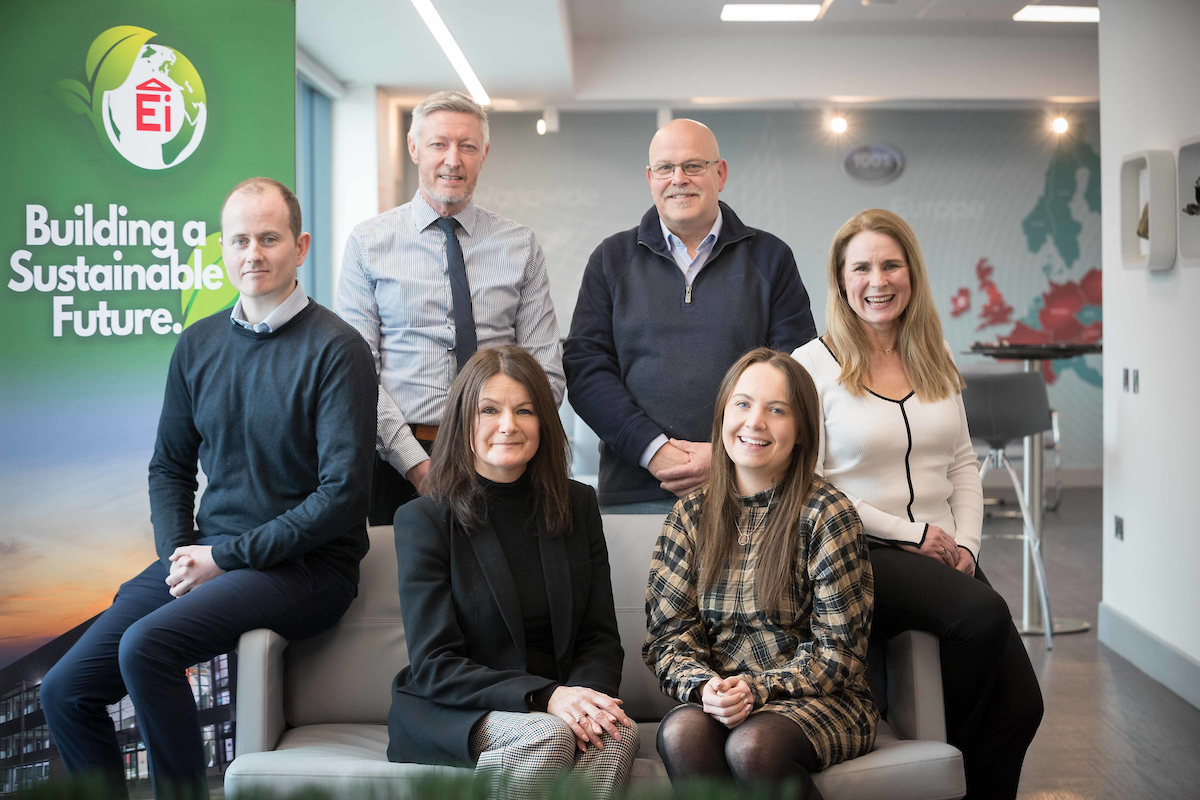
Wide range of supports available for companies seeking to attain energy efficiency
Pictured at the event in Ei Electronics’ Centre of Excellence in Shannon (seated l-r): Helen Downes, chief executive, Shannon Chamber, Ali Doherty, SEAI, and Sharon Malone, the Falls Hotel. Back row (l-r): Robert McCarthy, SEAI, David Keating, Ei Electronics and Steve Gorvel, Element Six. Photograph by Eamon Ward
Chamber member companies demonstrate steps being taken to reduce their carbon footprint
A recent event hosted by Shannon Chamber to assist businesses on their sustainability journeys has led to a greater appreciation not just of the supports available from Ireland’s national sustainable energy authority, SEAI, but also of the steps companies in the region are taking to reduce their carbon footprints.
In a fast-paced presentation, which was held in Ei Electronics’ Centre of Excellence, SEAI’s SME programme executive, Ali Doherty, and its EXEED programme manager, Jason Doherty, told attendees that the average SME can reduce its energy efficiency bill by 20-30% by implementing energy efficiency measures and that, typically, 10% savings can be achieved with little or no capital costs.
“It all centres on understanding your energy use, creating an energy action plan, and completing an energy audit,” they said.
Pointing attendees to the free e-learning platform – the Energy Academy (www.seai.ie/energyacademy) that SEAI has created to help users understand their energy use, they said that the academy has already given over 5,000 learners the confidence to reduce energy use in their workplaces.
“It is helping businesses to upskill their staff, through giving them practical, business-focused free training. It is enabling them to discover opportunities to reduce their energy use and save costs across all areas of their businesses,” Ms Doherty stated.
Outlining the wide range of supports and grants available from SEAI, including the Support Scheme for Energy Audits (SSEA), the Non-Domestic Microgren Scheme for Solar PVs, the Support Scheme for Renewable Heat, the Excellence in Energy Efficient Design (EXEED) certification and grant scheme, the Community Energy Grant, the Large Industry Energy Network, and the electric vehicles for business grant, which are all outlined in greater detail on SEAI’s website www.seai.ie, the presenters welcomed the opportunity to present to Shannon Chamber members and to assist them in meeting their sustainability targets.
In a panel discussion that followed the main presentations, Ei Electronics’ director of plant and manufacturing technology, David Keating, Element Six’s engineering and facilities manager, Steve Gorvel, and the Falls Hotel Ennistymon’s marketing and digital media manager, Sharon Malone, gave an overview of the initiatives their companies are taking to reduce their carbon emissions, what they have achieved to date, and the challenges they see ahead.
All took expert advice before starting on their sustainability journeys, and embarked on an education and training programme, with the Falls Hotel taking the mammoth step of installing a hydro-electric turbine on the river running alongside the hotel. This two-year project was done in consultation with Clare County Council, the fisheries board, environmental experts and consultants in hydro power.
“We installed a 220-kilowatt hydro turbine,” said Ms Malone.
“When the river is in full flow, we are getting 100% of our electricity needs from the river. In doing so, we have dramatically reduced our dependency on carbon fuels, to the point where we are now a carbon neutral property. We are the only hotel in Ireland to generate our own sustainable electricity in this manner. We are very proud of this achievement,” Ms Malone said.
The types of initiatives being rolled out by the panellists’ companies include the elimination of fossil fuel usage in Element Six, the removal of single-use plastics in the Falls Hotel, the installation of solar panels and the promotion of biodiversity in Ei Electronics.
All panellists cited the many challenges that lie ahead such the step change that will be needed if Ireland is to attain net zero by 2023.
“This will require a wider conversation and a shift in government thinking and legislation,” they said.
Welcoming the very interactive participation of the presenters, the panellists and attendees, Shannon Chamber chief executive Helen Downes said: “This event was one of many events that we will be organising through the Sustainability Task Force, which we have set up in conjunction with industry in the region. We want to support our members in their sustainability journeys and ultimately enable this region to be a stand-out example of what can be achieved through collaborative endeavour.”
